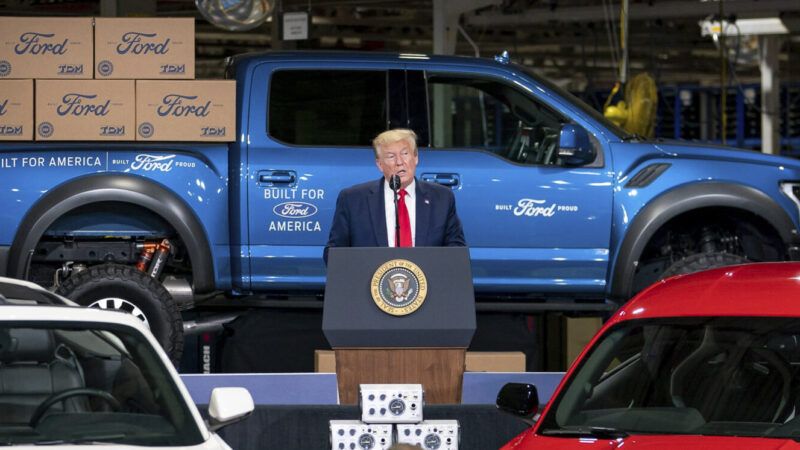Ford Paid $800 Million in Tariff Costs Over 3 Months, Despite Building Most of Its Cars in America
That should put an end to the Trump administration's silly talking point about how there is no tariff for products built in the U.S.

If President Donald Trump's tariffs were boosting the prospects of American-based manufacturing, then Ford Motor Co. ought to be one of the biggest winners.
After all, Ford builds more vehicles in the United States than any other automaker—it churned out 1.8 million of them last year—while employing around 57,000 manufacturing workers at plants across the upper Midwest. It's a legacy American brand, doing the sort of blue-collar work in the Rust Belt that the Trump administration believes its trade policies will directly benefit.
In reality, the tariffs are crushing Ford. The automaker announced this week that it paid $800 million in tariff-related expenses during the second quarter of 2025 (during which it posted its first quarterly loss since 2023), and that it expects the tariffs to reduce annual profits by about $3 billion. Even for a company that earned an operating profit of $10.2 billion last year, that's a tremendous blow.
In response, Ford is reportedly seeking relief from the very tariffs that are supposed to be helping them. Ford CEO Jim Farley told Bloomberg this week that Ford executives are having conversations "every day, every week, every month" with the Trump administration in an attempt to undo the "disadvantage" that the tariffs have created.
That ought to put an end to the Trump administration's silly talking point about how tariffs don't affect businesses that make their products in America. It turns out that 50 percent tariffs on steel and aluminum—two materials automakers require—and a 25 percent tariff on imported car parts have a dramatic impact on any American company that builds cars. Similarly, General Motors has reported that tariffs cost it more than $1 billion during the second quarter.
Carmakers, including Ford and G.M., have so far avoided passing the cost of the tariffs along to consumers—but they won't be able to do that for long with the losses piling up. The Detroit Free Press reports that various auto analysts expect consumer prices to rise by between 4 percent and 8 percent in the second half of the year.
Ironically, the fact that Ford builds so many of its cars in the United States makes it uniquely susceptible to Trump's tariff schemes. As The Wall Street Journal reported this week, the Trump administration's recently announced (though still not finalized) deals with Japan and the European Union will apply a lower tariff rate of 15 percent on finished cars imported from those places. Meanwhile, automakers toiling in the U.S. are facing relatively higher tariffs on the raw materials and parts they need.
In short: The tariffs are hurting the very industries they were supposed to help. It's time to put an end to this failing experiment in economic central planning.


Show Comments (132)